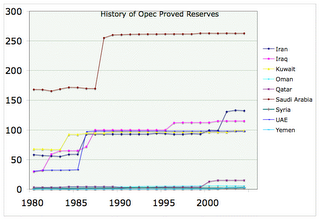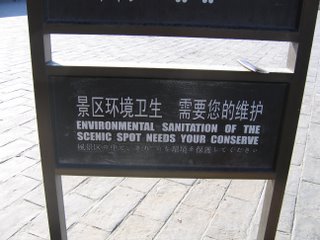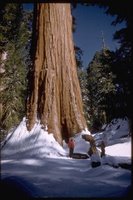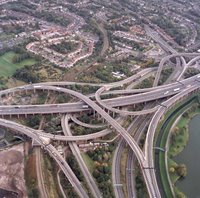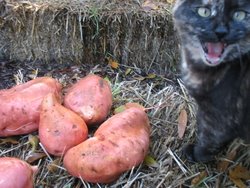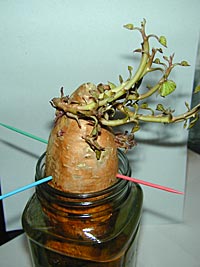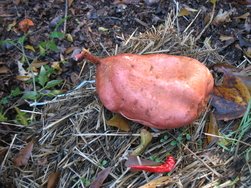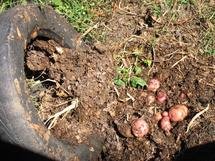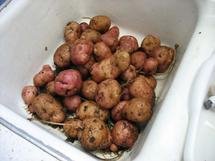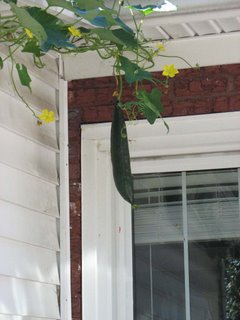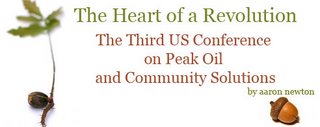 The following essay is a colletion of thoughts orginally published at Groovy Green.
The following essay is a colletion of thoughts orginally published at Groovy Green. Live your beliefs and you can turn the world around. -Thoreau
So I sent out a few letters post midterm election 2006, to get a response from those who are peak oil aware. The Democrats took control of the United States House of Representatives, a name that many in my generation find facetious. They also appear to have taken control of the Senate and while I don’t have a readymade joke for that body of Congress, please don’t assume I think them any more capable of addressing the issues of energy and environment currently facing the American dream. We are about to awaken from our slumber to the cold realities of recently dismissed phenomenon like physical limits and laws of nature. When I sent out my impromptu poll I was curious as to whether any of those concerned about the converging calamities associated with a consumer-based society believe that the recent swing of the political pendulum will have any effect on the readiness of America to weather the coming storm. The results were all but unanimous.
Let me stop and say that I am not by manner a pessimist. This might seem like a lie if you know me only through my shared thoughts of essay but in truth I am an optimist. Not out of belief but out of practice. I have been told time and again what was and was not in the cards concerning my future. Sometimes I wanted more than others thought was possible and on many occasions I have been pleasantly pleased at my ability to transcend their expectations. So grew an idea about ability that exceeds human anticipation without forgetting that there are reasonable limits to achievement. In other words I find human beings often underestimate their own abilities while simultaneously overestimating the aptitudes of technology. We are at once ready to believe that we are doomed because we can’t personally change and prepared to be saved by some unknown outside force. Sounds like a new religion.
Those whom I polled saw little hope that reasonable action would be taken in the United States concerning the coming global peak in oil production and the following energy decent- from a governmental standpoint that is. This point emerged: Do not count on the American Democrats to save the day. I could not help but have expected such an answer. U.S. Baby Boomers might turn out to be the most destructive generation in all of human history, but their failure to properly govern democratically, that is their susceptibility to big business as a corruptive influence, has my generation turning up its nose at even an unexpected Democratic victory in the shadow of Hubbert’s Peak. And who can blame them? However, that does not entitle us to adopt an attitude of defeat.
Many traditional environmentalists work from a place of anger. They are angry that others have dirtied their air and their water. They are angry that the government has allowed this to happen. There are a dramatic number of cases of childhood asthma attributed to power plant emissions. Our drinking water is full of toxins and hormones known to harm the health of countless Americans each year. The specific issue that most recently jangled my anger was mercury levels in big fish so strong that my pregnant wife was advised not to eat tuna. Industrial America has made it unsafe for her to do so. Yes, that’s enough to make anyone angry. From all of this anger comes an offensive to stop the pollution through active means. I’ve just read Derrick Jensen’s, Endgame Vol. I The Problem with Civilization. Mr. Jensen is an author and activist who goes further than most and calls for the active dismantling of industrial civilization. His arguments about fighting back and forcefully creating change are an easy sell to those who believe their clean air and fresh water have been taken from them. Many Americans are awake enough to see the extreme degradation of our environment as a direct consequence of our consumptive way of life. Even if they stop short of working to bring down civilization, these concerned individuals are willing and ready to fight back on behalf of Mother Nature. But I argue that strategy will never work. It over looks one simple fact. No one can force anyone to do anything. Sure someone could hold a gun to your head and force you to recycle but as soon as the gun is removed so is the incentive to recycle. The end result of such an exchange will probably establish in you a resentment of recycling and a reluctance to do so; the opposite of the intended effect. People can not be forced to believe in something. And unless they believe in something, they can’t change their behavior.
I am calling for a new way of imagining our relationship with the environment. Most people view their lives as their turn on the dance floor. They see themselves as having inherited the Earth from their parents and feel free to do with it as they please. I argue the opposite, that we are borrowing the Earth from our children. What we do they will have to deal with. This change in perspective separates the takers from the leavers. Daniel Quinn in his monumental work Ishmael, describes the human race as being made up of two groups; those who take what they can and those who leave as much as possible. Obviously those who are actively involved in polluting our planet are in the former group. They see themselves as free to do as they please and to take what they want regardless of the consequences left for future generations. I argue though that they are human and as such can not be forced to do anything otherwise.
Corporate America lobbies heavily against environmental legislation. When these laws are past, they are often later repealed or altered so as to make them less effective. Sometimes they are simply ignored. If all of these efforts fail, big business is usually ready to fight in court with well funded lawyers. When activists attempt to physically shut down caustic practices like nuclear power generation they are sometimes even met with violence, state sanctioned or otherwise. Even with righteousness on your side you can’t effectively force anyone to be environmentally responsible. It just won’t work in the long run.
The focus must first be on us. After all, we are the ones using the electricity created by Industrial Power Plants. Each of us is responsible for the products and services we buy and use. Our support of the system is to blame for the destructive nature of We the People (lately read We the Consumers). I agree with those who say that corporations have used psychological strategies to convince Americans to adopt consumptive lifestyles. The odd reality is though that even after we awake up from the spell of such strategies most of us continue to consume and in doing so prop up a system of destruction and pollution. I am not advocating that those of us who understand how horribly damaging our way of life has become should run off into the woods and abandon all we have come to know. Such a cold turkey response to the habit of industrial civilization will probably not last and will most certainly alienate us from friends and family. I am advocating though for a change in focus for those of us lucky enough to understand the great poisoning that has taken place and who want to beat it back.
We must change ourselves. We must change our habits. We must slowly drop out of consumer culture. We must remove our support of corporate monsters and return our support of local businesses. Forcing others to change won’t work but making real change happen in our own lives will. If you don’t support the production of nuclear waste and your electricity comes from a nuclear power plant, find a way to change that; not by protesting in front of the plant but by making your own power or, as my friend Sharon is doing in her kitchen, do away with your need for electrical power. “Wow” you say, “That’s crazy”, but the truth is it’s not. It’s the easiest, most effective way to make a difference. You won’t change the nuclear power plant people. You could dedicate countless hours of time to legal battles with those folks and would probably wind up with little to show for your efforts. Or you could walk away from their toxic waste and take your financial support for their power with you.
At this point I might be losing you because some obvious, classic questions arise from this direction of action. Sticking with the nuclear power plant example, the question is, “How do you make your own power or do away with the need for electricity?” There isn’t just one answer to this question. Start with evaluating how much electricity you use. Next work to reduce that amount. Don’t give into the idea that the change must be instant. The lack of perfection is an oft given excuse for a lack of effort. It might take years to achieve your goals in their entirety but that journey could start today. Perhaps you can provide your own solar or wind generated electricity. Before you scoff at the cost, do some investigation. Check into price, review government programs that offer financial incentives. Look into grants, build our own wind turbine, build a gigantic hamster wheel for your over active dog- my point is that in these efforts you will find, if you work hard enough, the solution to your problem. It lies within you, not as blame to be placed on others. I will guess that as you free yourself from the yoke of the nuclear power plant that others will be eager to learn more about what you did. There will be others who want this change as well and your efforts will help them to make change, not by storming the gates of the power plant but by removing your dependence on it and then helping others to do the same.
Perhaps your thinking that there are those who will never change. I understand your concern and I agree that there are those who will resist change with great force. The vast majority of people however will not. Most people are in the habit of following the lead of others. It’s not necessary for those of us trying to make change to convince everyone we’re right. We only have to become a small force of change, maybe 12% of the population. That number of people doing things differently, making a difference not on the picket lines but in our own lives, will be enough to help fuel a revolution of change across our country. Not a change in political parties but a true change in the attitudes and actions of Americans.
When discussing change there seems to be two typical responses concerning how and why change happens. The first is that the government mandates it and the second is that the invisible hand of Adam Smith makes it economically more attractive. Most people will use these responses as the only reasons for why things do or do not change. These people fail to recognize how defeatist this attitude is. These people have given up their own freedom of choice and the freedom of others in their society. Of course there are other reasons for making or not making change. In fact for most of the really important decisions we make in our lives, we don't require the permission of Congress or rely on rational financial sense. We don't get married to a certain someone for either of those reasons, we don't have children for those reasons, we don’t eat healthy foods for those reasons and I am going to assume that my friends don’t associate with me because President Bush asked them to or because they gain economic benefit from me.
Have we completely lost the ability to make our own decisions as a society about what is best without the help of the government or the market? Societies have historically made decisions about common items for the benefit of community and not because of the government or economics. Yes our society is fractured and in bad health so we all look like greedy bastards only interested in grilling out on the back porch but that is not at the heart of who we are as human beings. I reject the idea that reasonable responses to problems are possible only if it's affordable or if we're told we legally have to. I'll go further and say that I am a freer man than anyone who would argue otherwise.
We have great power over those who derive their wealth through the complex systems that force us into dependent relationships. If we step out of their systems of enslavement we can again do for ourselves what they want to charge us for. It’s been said before that growing your own food is one of the most radically rebellious acts you can perform. As I learn to grow my own food I see how true this really is. I am becoming less dependant on Archer Daniels Midland and other such agrobizcorporations. ADM is at the heart of industrial agriculture; a practice that is stripping away topsoil that took millions of years to create. It is using non-renewable resources to pesticide poison our foods and creates oceanic kill zones where sea life can’t live. It is irresponsible and destructive and every time I plant a potato I am supporting less of this legacy, this terrible bequest we are leaving to our children. I’m not going to protest at the front doors of ADM, I’m just going to quietly flip them the bird while I work in my garden. Already my neighbors are interested.
There are other simple ways in which we can once again take command of our own needs. Harvesting and recycling water, building clever homes from local, renewable materials. Harnessing the energy of the sun in direct ways; all of these are techniques that have fallen out of favor because of briefly available fossil fuel energy. These behaviors seem strange because during the last four or five decades citizens of the United States have been living in a manner that disregards ecological consciousness. Cyclic systems were abandoned for linear ones in which oil and other fossil fuels were put in at the beginning, products were used in the middle and in the end the waste was buried in the ground. Our recent lives haven’t been dependant on natural cycles so we haven’t paid them any attention. What a long winded way of saying that these aren’t radical new ideas, they’re the wisdom of our mothers and fathers; the ways of doing things that worked well for thousands of years.
Sankofa is an African word that means to go back and retrieve wisdom and use it to move forward. In it lies the key to our future. With it we can step out of corporate dependence and without throwing a punch or filing a lawsuit we can whisper to those who would destroy my daughter’s planet, “Go away, we don’t need you.”
I can’t say I’m not pleased that the Republican stranglehold on our federal system of checks and balances has come to an end. It is the result I was hoping for. A sense of anxiety in me has receded following Election Day. But almost instantly that anxiety was replaced with a sense of fear. What if this legislative body doesn’t do any better? It’s time to stop placing our bets on others and recognize in ourselves the possibility of something those fools can’t conceive- a society of just rule and inclusion; a system of operation that allows human beings to carry on with an experiment that hopefully becomes more benign, more compassionate and more responsive to the ecological systems that hold ultimate veto over our existence.
 Until last weekend I had never met the woman who lives across the street from me. That is embarrassing to say as I’ve lived in my home for more than four years now. I know many of the families who live on my short street but I had never met Jean until last Sunday. She is an elderly lady with bright eyes who is not afraid of silence.
Until last weekend I had never met the woman who lives across the street from me. That is embarrassing to say as I’ve lived in my home for more than four years now. I know many of the families who live on my short street but I had never met Jean until last Sunday. She is an elderly lady with bright eyes who is not afraid of silence.







